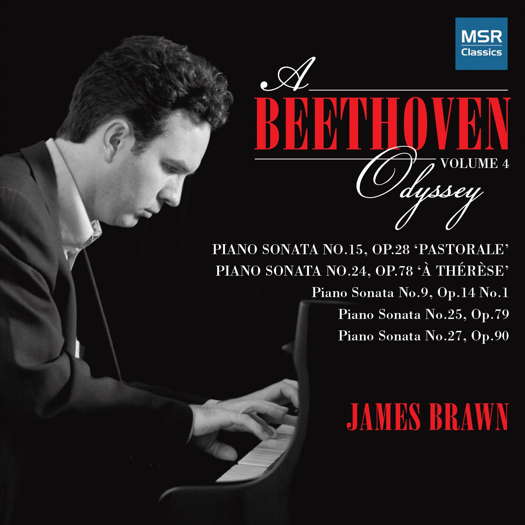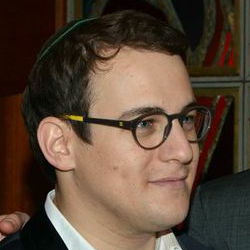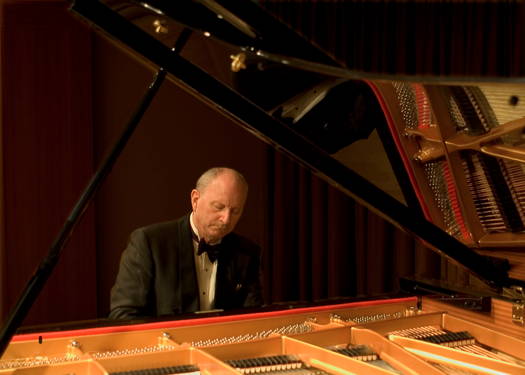- Peter Katin
- Aleksey Zhivotov
- Music and Media Consulting
- Peter Alexander Goehr
- Ethelbert Nevin
- Ysaÿe
- Robert Spano
- funny
 SPONSORED: CD Spotlight. Pure Magic - James Brawn's continued Beethoven Odyssey, awaited by Andrew Schartmann.
SPONSORED: CD Spotlight. Pure Magic - James Brawn's continued Beethoven Odyssey, awaited by Andrew Schartmann.
All sponsored features >>
 SPONSORED: Ensemble. Melting Rhapsody - Malcolm Miller enjoys Jack Liebeck and Danny Driver's 'Hebrew Melody' recital, plus a recital by David Aaron Carpenter.
SPONSORED: Ensemble. Melting Rhapsody - Malcolm Miller enjoys Jack Liebeck and Danny Driver's 'Hebrew Melody' recital, plus a recital by David Aaron Carpenter.
All sponsored features >>
JEROME ROSE

In the build-up to New York's
International Keyboard Institute and Festival,
RICHARD MESZTO writes about the festival's founder
Modern music is a strange place. What counts as music - the popular variety - is of simple manner, youthful (perhaps childish) subject and far too often of pornographic expression. Some may find some of these elements uninteresting. The fact is that the massive audiences for pop music prove the attractiveness of the methods.
Still, if I may hesitatingly suggest, all is not right in the state of music. While the claims of world music, the enormous number of genres for even heavy metal, the claims of equality for pop, rock, jazz, rap, etc etc are all fine and good, the equality is not quite extended across the board.
Classical Music in its various forms is not often given this sort of acceptance. Some people think it pretentious. Some think it suitable only for stuffed shirts. Some can only go to symphony concerts when they play rock music by classic artists like Led Zeppelin and The Rolling Stones.
But, to suggest that one likes Classical music is to place oneself out of the fold, beyond the pale, at the outer limits.
I think this is wrong.
One thing I want to make clear though is that as I've talked so far about Classical Music, I have not been thinking of Bach, and Beethoven at all. I was actually thinking of Western Classical Music, Arabic Classical Music, East Indian Classical Music, Chinese Classical Music, Japanese Classical Music, Turkish Classical Music and so on.
All of these are phenomenal traditions of great music that we would do well to preserve and maintain - and listen to.
It is wrong to forget these musics.
And that is why the activities of Jerome Rose as pianist, teacher, and festival organizer are so vital and crucial.
He is actually doing something to preserve the tradition that he is legitimate heir to: Western Classical Music and specifically Classical Piano Performance.

Jerome Rose. Photo © 2007 John Landolfi
Jerome Rose was born in 1938 and studied with Adolph Baller, Leonard Shure and Rudolph Serkin. In 1961 he won the Busoni Competition and was launched on a wide ranging and impressive career. Rose has performed with the most eminent conductors of his day - Sergiu Comissiona, Josef Krips, Sir Charles Mackerras, Wolfgang Sawallisch, Stanislaw Skrowaczewski, Sir Georg Solti, Robert Spano, Christian Thielemann, Hans Vonk and David Zinman.
Often Jerome Rose is very closely associated with the music of Franz Liszt, but this is something of an optical illusion. He said:
'I have forever been known as a Liszt specialist. I find this quite amusing since this was never part of my upbringing, having been a Schnabel grandchild [musically speaking, of course - ed.] as a student of Leonard Shure, who had a very low estimation of Franz Liszt as a composer.' - Jerome Rose in conversation with Malcolm Troup, EPTA, 2009
In fact, Rose knows most of Beethoven, the large scale works of Schubert, much of Chopin, a goodly portion of Schumann and enough of Brahms to fill several shelves. For many years he carried dozens of concerti in his repertoire, including rare works by Hiller, Mosonyi, Volkmann and the rarely performed concerto by Schoenberg.
His Beethoven interpretations stem from the tradition of Schnabel, Leonard Shure and Rudolph Serkin. They are vigorous, strong willed, scrupulously accurate, eschew the merely sentimental, and prefer an orchestral limit to rubato. At some times, one senses the loss of some beauty of tone (that someone like Paderewski, de Pachmann or even Friedman had). But, no matter what, the intention is always serious.
Rose's Schubert is powerful, wise and profound. And here, he does indulge in the creation of a beautiful tone - as the opening of his performance of the G major Sonata attests.
Listen — Schubert: Piano Sonata in G major
(0:28-1:11) © 2014 Jerome Rose / International Keyboard Institute & Festival :
I had the good fortune to hear him perform the Schubert Piano Sonata in A major, D 959 and what was most astounding was his intense focus through the entire work. The scope and range of his thinking were enormous.
For a brilliant analysis of Rose’s Schubert late Sonata performances read John Bell Young’s Music & Vision review:
MAGISTERIAL COMMAND - JEROME ROSE PLAYS SCHUBERT
It may be that in the music of Robert Schumann, Jerome Rose reaches the peak of his interpretative skills. I leave it to readers to discover this for themselves.
But these comments on his approach and preferences are but signs of his personality - and that each artist must have.
As a teacher Rose has advised countless students in private lessons and master classes. He was always profoundly dedicated to the student who seriously sought to understand music and play better. I recall one pianist, many years ago, who was struggling and Rose made sure that he had the guidance and advice he needed to succeed. This included inviting the student to his home for dinner and then providing a five-hour lesson that ended just before midnight. This sort of extra coaching went on for weeks until the pianist was ready for his graduating recital.
Knowing that music is also made with patrons, Jerome Rose has sought them out and encouraged them to support major musical festivals. He has been Artistic Director of the International Festival of the Romantics in London, and the Schubert and Brahms Festival at the Library of Congress in Washington DC. He also organized a Liszt Centennial Celebration Festival in 1986 in Washington DC.
For the last twenty years, New York has been home to the IKIF (International Keyboard Institute and Festival) a two week extravaganza of high level piano recitals, student performances, master classes and lectures. The founder of these festivals, Jerome Rose has organized, encouraged and designed them in great creative detail. The series is about to begin, and as per tradition, Jerome Rose will present the first concert on 14 July 2019:
8pm: Masters Series Concert - Merkin Hall - Jerome Rose
Chopin: Polonaise-Fantaisie in A flat major, Op 61
Schumann: Kreisleriana, Op 16
Brahms: Piano Sonata No 3 in F minor, Op 5
The purpose of the festival is important: to sustain and maintain the tradition of music that the piano represents. Jerome Rose has evidently, sincerely and effectively dedicated his life to the music he so deeply admires, understands and respects. He is without doubt one of the most eminent of pianists.
Copyright © 11 July 2019
Richard Meszto,
Mazeppa, Alberta, Canada


